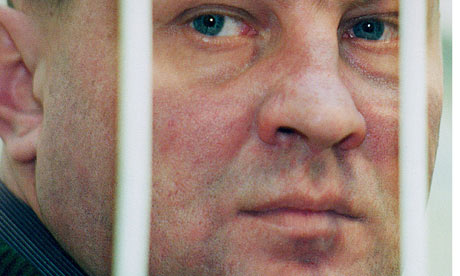Grisly lawyer murder all too familiar to Russians
 Moscow - Passersby on their lunch break in downtown Moscow on Monday were witness to a brazen double murder by a hired hit man, but the news was dulled by the fact that it seemed all too familiar.
Moscow - Passersby on their lunch break in downtown Moscow on Monday were witness to a brazen double murder by a hired hit man, but the news was dulled by the fact that it seemed all too familiar.
Prominent human rights lawyer Stanislav Markelov left a press conference that day in the company of young journalist Anastasia Baburova at about 3 pm (1200 GMT), before joining the bustle headed to the Kropotinskaya metro station.
The neighbourhood has some of the highest rents in Moscow, with views over the Kremlin. It is a three-minute walk from the white marble Christ the Saviour Cathedral, where a new Orthodox Patriarch will be named next week.
In 2000, when the church's cupolas were gilded, Russia was said to have left its worst days behind, and was well into an oil-fuelled boom, exulting in the popular rule of Vladimir Putin.
But "this killing would have struck us as bold and terrible, even in the crime-rampant years of the early 1990s," a correspondent on state-owned radio Vesti-24 said Monday.
For most, the association was to the contract-style killing of investigative journalist Anna Politkoskaya three years ago.
Markelov, 34, most recently acted for the families of an 18-year- old Chechen girl killed by a Russian officer, an opposition journalist beaten to death in November and victims of neo-fascist hate crimes.
He was shot at point-blank range by a masked man, whose pistol was fitted with a silencer. The daily Kommersant cited witnesses as saying Anastasia Baburova was then shot in the head after she screamed and took a few dazed steps towards the killer.
On Tuesday, people laid flowers next to the blood-stained snow where Markelov was murdered.
At the press conference just minutes before his murder, Markelov had protested the early release of a Russian officer, whom he helped indict for a 10-year sentence for killing the Chechen girl, Kheda Kungayeva.
Yuri Budanov was the first officer charged for crimes against a civilian during two federal wars in Chechnya and became a symbol of the human rights abuses committed by Russian troops there in the early 1990s.
Colonel Budanov admitted to strangling the girl in anger during an interrogation.
But Russian nationalists rallied around Budanov during his trial, holding him up as a military hero in a bloody but successful war against Chechen insurgents. Budanov made parole one year early for good behaviour.
Visa Kungayev, Kheda's father, said Markelov had received text messages threatening his life if he did not stop his work on the Budanov case.
"The whole family is shocked and speechless. There is no doubt that my lawyer was killed by Budanov and his gang. I feel sorry for this professional. This person was killed in broad daylight in Moscow and the criminal escapes," Kungayev said.
The Kungayev family, who are currently in Norway, were given protection by local police on Tuesday, Russian news agency Ria- Novosti said.
"Investigators have already grasped that this was a contract killing related to the lawyer's professional work," agencies quoted a law enforcement source as saying Tuesday.
But rights activists said Tuesday the Budanov case was not the most controversial Markelov took on, as he was becoming increasingly involved in the prosecution of violent neo-Nazi crimes, which experts say have been on the rise in Russia in recent years.
In an article published by Novaya Gazeta the day before her murder, Baburova cited Markelov regretting the leniency of three-year jail sentence handed to the leader of a neo-Nazi group who filmed a video of a Tadjik man hung by executioners in garb reminiscent of the Ku Klux Klan.
Markelov also worked on many of the Chechen human rights cases that Politkovskaya's articles exposed, and represented the family of another Novaya Gazeta journalist who died from blows to the head in 2000.
With the death of Barburova, at least four Novaya Gazeta journalists have met a violent end since 2000, the newspaper's deputy editor Andrey Lipskiy said.
Amnesty International and Reporters without Borders urged authorities in separate statements Tuesday to investigate the crimes and show they will not be tolerated.
But well-known rights activists and Kremlin critic Lev Ponomaryov on Tuesday said just the opposite was being proved by Russian authorities' failure to prosecute anyone for the murder of journalists, including Politkovskaya.
"It's obvious now that being involved in human rights work is life-threatening work in today's Russia," he said.
Markelov is survived by a wife and two children.
His brother, Mikhail Markelov, an aspiring journalist, launched an appeal to colleagues Tuesday to wield his brother's name cautiously.
"For us right now, the most important question is the security of his family," he told news agency Interfax. (dpa)